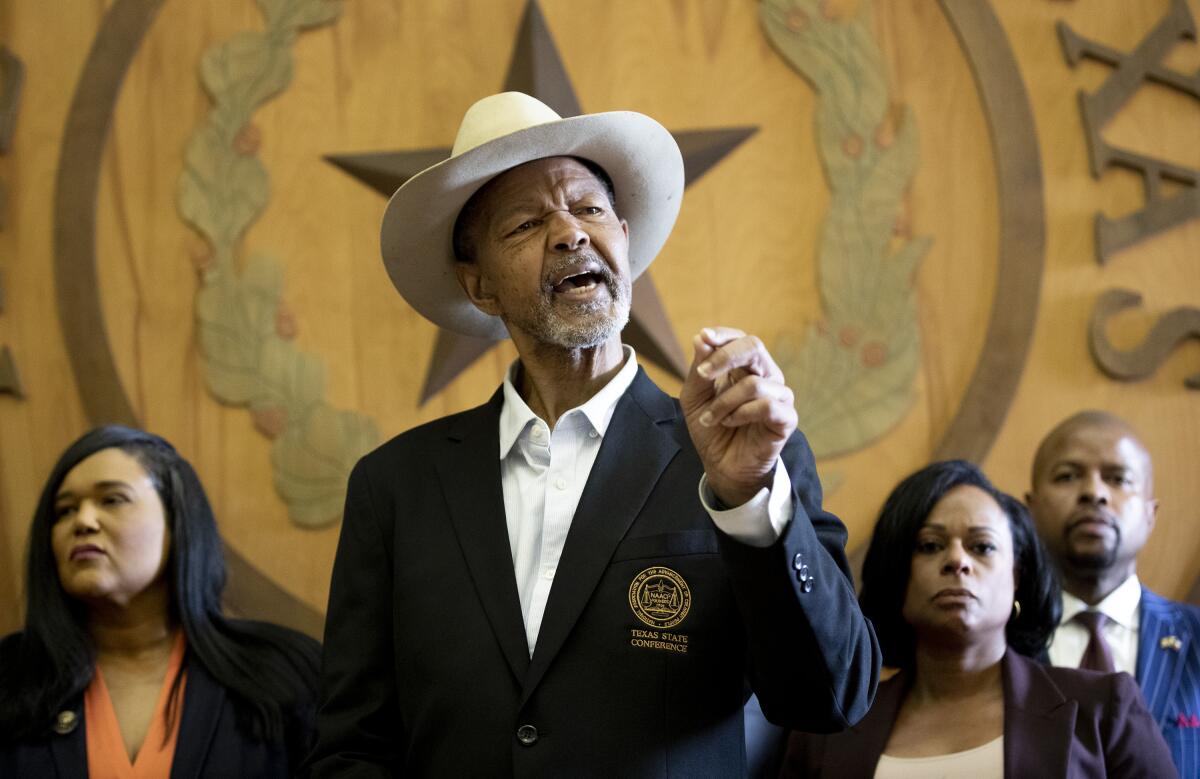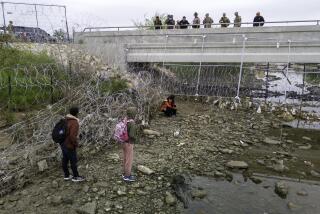Explainer: How Texas Republicans aim to make voting harder

- Share via
AUSTIN, Texas — Texas has taken a major step toward becoming the nation’s largest state where the GOP is making voting harder following the 2020 elections, with the Senate approval Sunday of a bill that would empower poll watchers, create criminal penalties and add new restrictions on where, when and how to vote.
Advocates say the changes would disproportionately affect minorities and people with disabilities.
The legislation still has two remaining steps before it becomes the law in Texas: a final vote of approval in the GOP-controlled House, which would send the bill to Republican Gov. Greg Abbott, who is is expected to sign off. It failed to pass Sunday night after Democrats walked out of the House chamber before a midnight deadline.
Abbott swiftly said he would call a special session to try passing a voting bill again but did not say when.
America’s largest red state already has some of the tightest voting restrictions in the country and is regularly cited by nonpartisan groups as a state where voting is especially difficult. It was one of the few states that did not make it easier to vote by mail during the coronavirus pandemic, instead sending droves of voters to the polls to cast their ballots in person.
Senate approval of the wide-ranging legislation happened at 6 a.m. Sunday, hours after after a final version of the 67-page bill was released from private negotiations on Saturday. Democrats questioned Republicans about the legislation for eight hours in their final attempts to block the changes from becoming law.
The timing gives the public little time to review — or protest — the overhaul during the Memorial Day holiday weekend, and the legislative session ends by law on Monday.
So what’s included in the planned changes and how did they come about? Here are some details:
What the legislation means for voters and election officials
The GOP legislation — known as Senate Bill 7 — proposes cutting back on early voting, banning drive-through voting and making it a felony for elected voting officials to send unsolicited mail-ballot applications to Texas voters. Harris County — which includes Houston, the nation’s fourth-largest city, and is a Democratic stronghold — introduced drive-through voting for November’s election, but courts blocked election officials from sending mail-voting applications to all registered voters.
Final wording of the legislation also adds a voter ID requirement to mail-ballot applications, requiring voters to submit a driver’s license or Social Security number.
Early voting on Sundays also could not begin before 1 p.m., which Democrats say would depress turnout among Black churchgoers who cast their ballots after morning worship services in “souls to the polls” efforts.
Additionally, the bill would require people who are helping voters to disclose their relationship to the voter, whether they were paid to help and whether the voter is eligible to receive assistance and could face a state jail felony for violations.
But partisan poll watchers — looking to raise concerns to their political party — would have more access, and election workers could be charged with a crime if they blocked a poll watcher’s view.
“It is a solution in search of a problem,” said Democratic state Rep. Nicole Collier, chairwoman of the Texas Legislative Black Caucus. “I don’t know what they are trying to address. They won the election; I don’t know where the voter fraud is occurring.”
The answer from Republican state Rep. Briscoe Cain, one of the lead authors of the bills: “We don’t need to wait for bad things to happen to protect the security of the election.”
How the legislation came about
Republican lawmakers in Texas are looking to add restrictions similar to those their GOP colleagues in Florida, Georgia and Arizona made into law using former President Trump’s false assertions of election fraud to justify new rules in the name of election security. (Elections experts say election fraud is exceedingly rare.)
In Texas, the GOP has insisted that the changes are needed to restore confidence in the voting process, and not a response to Trump’s unsubstantiated claims. Republicans in Texas continued to see their margins of victory shrink in November but still won up and down the ballot.
Originally, GOP members of each chamber had submitted their own omnibus voting legislation just before the state’s filing deadline. Sunday’s combined legislation added 12 additional pages of new restrictions. The latest version also deleted language that would allow election officials to have poll watchers removed if they breached the peace.
What the concerns are around transparency
The final version of the bill was hashed out behind closed doors by a 10-person bipartisan committee of lawmakers from both chambers before it was sent back to the full House and Senate for final votes. Known as a conference committee, the panel is majority Republican, so the party that proposed the restrictions remained in control.
Voting rights advocates were alarmed that the committee met without making its negotiations public. And some Democratic members of the committee said they had little to no input on the final contents of the bill.
More to Read
Sign up for Essential California
The most important California stories and recommendations in your inbox every morning.
You may occasionally receive promotional content from the Los Angeles Times.










